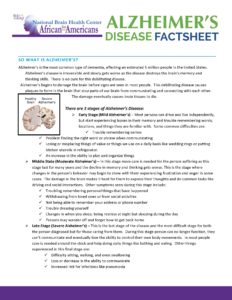Alzheimer’s Disease
– Fact Sheet
So what is alzheimer’s?
 Alzheimer’s is the most common type of dementia, affecting an estimated 5 million people in the United States. Alzheimer’s disease is irreversible and slowly gets worse as the disease destroys the brain’s memory and thinking skills. There is no cure for this debilitating disease.
Alzheimer’s is the most common type of dementia, affecting an estimated 5 million people in the United States. Alzheimer’s disease is irreversible and slowly gets worse as the disease destroys the brain’s memory and thinking skills. There is no cure for this debilitating disease.
Alzheimer’s begins to damage the brain before signs are seen in most people. This debilitating disease causes plaques to form in the brain that stop parts of our brain from communicating and connecting with each other. The damage eventually causes brain tissues to die.
There are 3 stages of Alzheimer’s Disease:
- Early Stage (Mild Alzheimer’s) – Most persons can drive and live independently, but start experiencing lapses in their memory and trouble remembering words, locations, and things they are familiar with. Some common difficulties are:
- Trouble remembering names
- Problem finding the right word or phrase when communicating
- Losing or misplacing things of value or things we use on a daily basis like wedding rings or putting kitchen utensils in refrigerator.
- An increase in the ability to plan and organize things
- Middle State (Moderate Alzheimer’s) – In this stage more care is needed for the person suffering as this stage last for many years and the decline in memory and thinking gets worse. This is the stage where changes in the person’s behavior may begin to show with them experiencing frustration and anger in some cases. The damage in the brain makes it hard for them to express their thoughts and do common tasks like driving and social interactions. Other symptoms seen during this stage include:
- Troubling remembering personal things that have happened
- Withdrawing from loved ones or from social activities
- Not being able to remember your address or phone number
- Trouble dressing yourself
- Changes in when you sleep; being restless at night but sleeping during the day
- Persons may wander off and forget how to get back home
- Late-Stage (Severe Alzheimer’s) – This is the last stage of the disease and the most difficult stage for both the person diagnosed but for those caring from them. During this stage person can no longer function, they can’t communicate and eventually lose the ability to control their own body movements. In most people care is needed around the clock and help doing daily things like bathing and eating. Other things experienced in this final stage are:
- Difficulty sitting, walking, and even swallowing
- Loss or decrease in the ability to communicate
- Increased risk for infections like pneumonia
Disparities of Alzheimer’s & African-Americans
 Alzheimer’s disease impacts African-Americans and Hispanics disproportionately. African-Americans are impacted worse being twice as likely to have Alzheimer’s. Other health conditions like high blood pressure and socioeconomic factors contribute to the challenges of addressing Alzheimer’s in the African-American community. African-Americans and minorities are also more likely to be diagnosed with Alzheimer’s in the later stages of the disease or to be misdiagnosed to due other illnesses, a lack of awareness, and a lack of access to appropriate medical care. There is a strong need for more data and information that is specific to the African-American community in terms of not only disease More research is needed to get a better picture of not only the state of the disease in minority communities but also to identify culturally appropriate strategies to address them.
Alzheimer’s disease impacts African-Americans and Hispanics disproportionately. African-Americans are impacted worse being twice as likely to have Alzheimer’s. Other health conditions like high blood pressure and socioeconomic factors contribute to the challenges of addressing Alzheimer’s in the African-American community. African-Americans and minorities are also more likely to be diagnosed with Alzheimer’s in the later stages of the disease or to be misdiagnosed to due other illnesses, a lack of awareness, and a lack of access to appropriate medical care. There is a strong need for more data and information that is specific to the African-American community in terms of not only disease More research is needed to get a better picture of not only the state of the disease in minority communities but also to identify culturally appropriate strategies to address them.
How Do I know if I have alzheimer’s disease?
Doctors and researchers are still trying to find out what causes Alzheimer’s. For most people, the cause has been linked to genetics. Other causes of the disease are related to our environment and lifestyles. One of the first signs of Alzheimer’s is having trouble with remembering things. We all have a decline in our memory as we age, but when the memory loss is are more than what is normal for our age, we have what is called, Mild Cognitive Impairment (MCI), which increases our risk for developing Alzheimer’s.
Symptoms can be different for each person. Other common signs and symptoms seen in the earlier stages of the disease are trouble with how we think and in our ability to do things like reading and make daily decisions. More research is needed to identify blood test and other ways to find Alzheimer’s earlier in those that show some of these signs.
Is there a way to stop or prevent alzheimer’s?
There is so much that is still begin learned about Alzheimer’s disease, its causes and how to treat it. Similar to other chronic health conditions, we can help reduce our risk for Alzheimer’s by making healthier and better lifestyle choices. Eating healthy food like more fruits, vegetables and whole grains could help to reduce our risk along with being active and doing things that help to keep our brain stimulated. Research and clinical trials are continuing to look into these relationships between Alzheimer’s and how we live to identify more ways to combat this 100% deadly disease.
